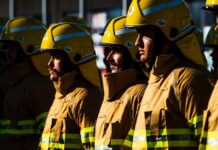I came across America’s Cup coverage last weekend like a 1950s mountaineer emerging from an Arctic expedition to find that Kiwi beekeeper Edmund Hillary and Nepalese sherpa Tenzing Norgay had scaled Mount Everest for the first time.
In the near-oblivion of making-the-best-of-school-holidays, there I was – a lifetime yachtie – with Team New Zealand on the leader board, defending its America’s Cup title for a third time in historic Barcelona, a capital of earthly desires but, out on the water, the same primal battlefield that New Zealand has dominated through decades.
Here the ubiquitous advertising, the big bucks luxury goods, the bread-and-circuses punditry stopped, replaced by the lantern jaw and steel gaze of ace skipper Peter Burling and the astonishing technology that has a 75-foot sailing vessel – looking every much like a giant alligator – literally flying over the water on its prehensile toes.
Of course the fat lady hasn’t sung yet, as old-timers will instantly point out, but the first day’s racing was literally a breath of sea air after a two year litany of raucous political dissatisfaction and determined short-termism that has come to be the norm out of Wellington.
The eye-watering amount of money New Zealand and Auckland didn’t garner during our last successful America’s Cup defence here in the closing days of the Covid dislocation pales into insignificance in comparison to the billions now being clawed back from schools, health services, armed forces, hospital care, regional towns, desperately needed new Cook Strait ferries, the public service and succour for rags of our once-thriving manufacturing and industrial sectors.
The stationery bill alone, across all this “off-with-his-head” Through the Looking Glass mayhem must be extraordinary. All that cruel hardship, presumably to repay the lobbyists and the influential few who squawked and donated so generously through a horrible election year devoid of any meaningful discussion of policy, evidence of data or even basic humanity.
Environmental protections fought and hard won over years are being liquidated at pace. We made the Guardian’s global news addition with mining in the south Taranaki bight. The Hauraki Gulf is back on track to build a billion-dollar commercial fishing industry despite being on the brink of ecological collapse. Mining interests are getting their big break.
Any one strand of these and all the other cheeseparing measures would be enough to cover the $3 billion landlord bonanza proposed by the prime minister (himself a significant residential landlord).
Someone might tell the coalition government that a genuinely thriving economy needs, at very least, a stable population that is warm, fed, housed, educated and sociably connected. Genuinely participatory in its immediate affairs and resourced for the coming generations to live productive lives.
All of which my generation had in the years between the second World War and the Muldoon/Rogernomic revolution and its comet tail of shameful inequality.
The three years of Covid deprivations again hit hard at families, especially when both parents were working in essential services and school-aged children were cooped up at home. That extreme disruption, along with child poverty figures, barely made a headline before the election.
Then bank interest shot up and the housing market scraped the barrel of family finances. By January, there was alarm (but not enough) about pouring legislation through under urgency and with damn all expert advice.
These serial decisions and justifications to do less and worse, as with school lunches, or punitive measures such as fining parents and everyone else in sight over truancy, are embarrassingly awful.
In all this last year, young people might not have existed on the national agenda, either as valued individuals or as the future of the race.
Their education has taken a king hit, government funding a political football and now they are grudged even school lunches for those that need them. For the majority, two parents must work. School learning and health is impaired for the hungry and impacts on the learning environment. To the detriment of future workforces, if the talking heads of the hard right were honest.
To get our shape-shifter economy ‘back on track’, ACT leader David Seymour has been hammering the statistic that 46 percent of students aren’t ‘regularly’ attending school every day for 90 percent of the time. A flawed figure that includes not only chronic truant days but also the 57 percent of total absence time due to illness, being stood down, or for reasons deemed acceptable within a school’s attendance policy including a family bereavement.
Absences outside the control of parents, schools and previous governments alike, as Rachel Judkins said in a Spinoff column.
Ministry statistics for daily attendance showed 85 percent – 26 students out of a class of 30 – were present on any given day – a different story.
Netflix with its glowing planet, abundant lifestyles, glossy film locations and the Hunger Games of elite sports will show coming generations what we are losing and their rage won’t easily stop at soppy sadness.
• Liz Waters
© Waiheke Gulf News Ltd 2024






